The mad carousel of our times: In Germany, the ghosts of the 1930s are invoked almost daily; between the USA and Russia, the Molotov-Ribbentrop pact is being re-enacted; meanwhile, in Italy, Giorgia Meloni challenges one of the EU's founding documents—revealing more about herself than she perhaps intended.
"This is not my Europe", declared Italian Prime Minister Giorgia Meloni in a brief statement to the Roman parliament on Wednesday last week.
She was referring to a pro-European street demonstration that had filled the streets of Rome the previous Saturday. Meloni was particularly shocked by the fact that the demonstrators weren't marching under political party banners, but simply… for Europe. Their only banner was the “Manifesto of Ventotene ” — at once an anti-fascist manifesto, the most visionary call for a united Europe, written when Hitler's armies seemed on the verge of winning the war in 1941, and a foundational text for my pro-European generation.
This was too much for Giorgia Meloni.
Almost a provocation.
So she decided to provoke in return.
During a parliamentary discussion, Meloni quoted selected passages from the Manifesto of Ventotene:
"The European revolution to meet our needs must be socialist" (…) "Private property must be abolished, limited, corrected, extended case by case, not dogmatically".
"In revolutionary times when institutions must not merely be administered but created, democratic practice fails spectacularly. At the moment when maximum decisiveness and boldness are needed, democrats feel lost without spontaneous popular consent behind them but only a turbid tumult of passions".
“The revolutionary party, derives its vision and certainty about what must be done not from any prior validation by a not yet existent popular will, but from its consciousness of representing the profound needs of modern society. In this way it provides the first directives of the new order, the first social discipline to the new masses. Through this dictatorship of the revolutionary party, the new state is formed and around it the new democracy".
She concluded,
"I don't know if this is your Europe, but it certainly isn't mine."
I stopped recording the video when the big clash broke out: The opposition immediately protested, leading to chaotic scenes and the suspension of several sessions for fear of physical confrontation. The left denounced it as a "disgrace" that this honourable document should be attacked in these hallowed halls, while the right dismissed it as a "terrible text". The heated debate continued the next day in the Senate, Italian Parliament's second chamber.
The controversy reached Brussels, where the President of the European Parliament, Roberta Metsola - a christian-conservative who usually maintains good relations with Meloni - broke with her usual good partner:
Metsola: “The 1941 Manifesto of Ventotene is a piece of history that launched for the first time the idea of a federal Europe”. The Manifesto contained "the first traces of the idea of a federal Europe", said Metsola. "Europe grew on the shoulders of many giants, including Italians”. (…) "Yesterday, I discussed with Meloni only about today's issues, I certainly don't want to question her European commitment, what I can say is that, if we look at the way Europe developed, Italy has always been at the centre", noted Metsola.
Does Europe rest on the shoulders of anti-democratic, illiberal giants?
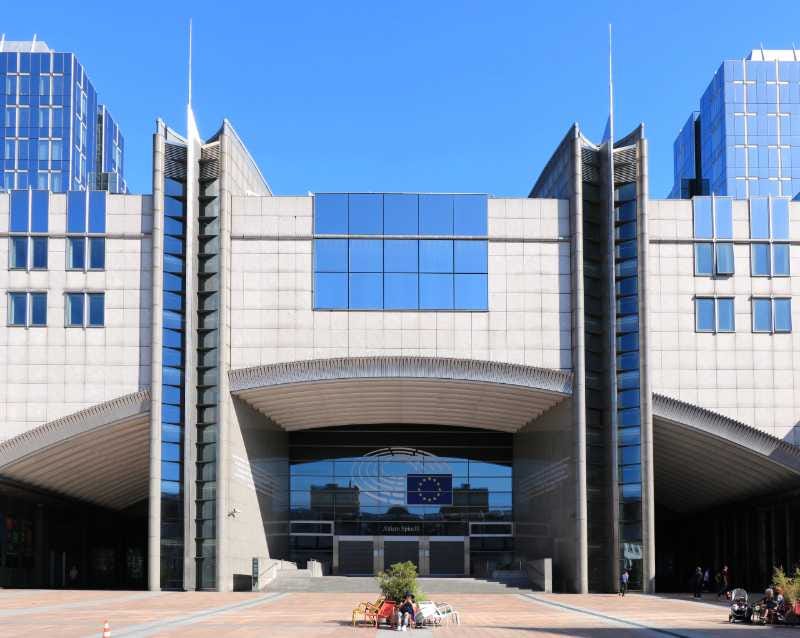
We live in an era of narrative reframing and social media, where phrases are pulled out of context to construct new stories. We live amid pseudo-history and conspiracy theories, in times when few people read—except in this curious world of Substack (a happy island, a separate world, a bubble?).
In Italy, Meloni finds an easy audience. While it's true we all studied the Ventotene Manifesto in school, how many have actually read it?
Yet Meloni overlooked something crucial: today, words spoken in one corner of the world instantly reach the other side. And discussing something often kindles curiosity to learn more about it. So let's explore this manifesto, written by intellectuals whom Mussolini confined to a small island in the Gulf of Gaeta, called Ventotene (prononced: Venn-toh-TEH-nay).
There, bringing together their diverse perspectives—liberal, communist, and socialist—they envisioned a possible future when others could see only darkness.
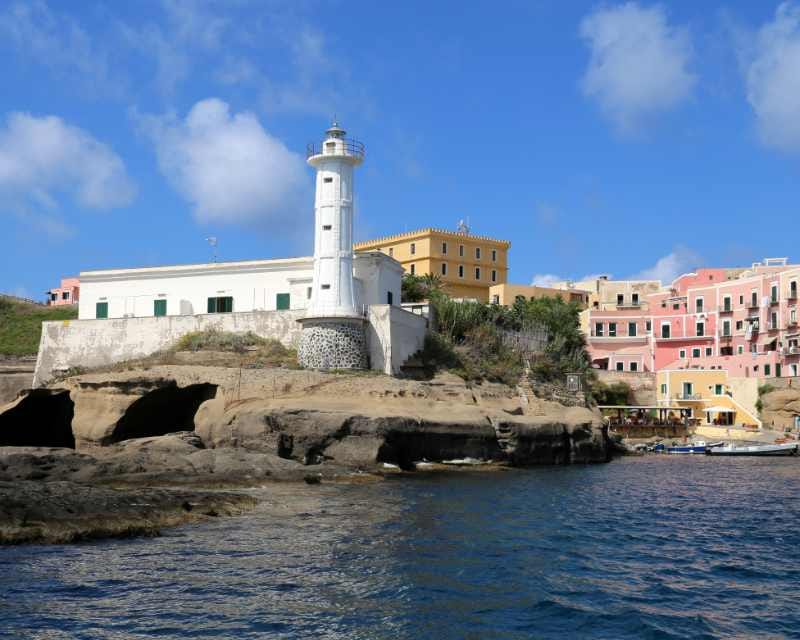
For a free and United Europe: the Ventotene Manifesto.
The island of Ventotene, now an idyllic spot for tourists who love going off the beaten path, sits next to the better-known holiday island of Ponza. During Benito Mussolini's fascist regime, it served as a sea-surrounded prison.
Under the special laws of 1926, the fascist regime established political confinement as a preventive measure to remove supposed enemies of the state. Even minor acts—such as attending a communist funeral, criticizing the regime, or reading "subversive" material—could result in confinement. Sentences typically lasted between one and five years, with the possibility of renewal.
The Ventotene colony became the main confinement center. Prisoners lived under strict surveillance with limited movement, frequent checks, and censored correspondence. Despite these conditions, they created an organized community that became an extraordinary intellectual center, nicknamed "the University of confinement."
There, in those darkest times of 1941, three men from different political camps—Altiero Spinelli1, Ernesto Rossi2 and Eugenio Colorni3 —wrote down their idea of a united and anti-fascist Europe and smuggled it to the mainland:
"Per un'Europa libera e unita"
”For a free and United Europe”
They perceived a single, continuous war: one that began in 1914 and emerged as the inevitable result of Europe's fragmentation and its submission to nationalistic and imperialistic greed. To that, a radical answer was needed. What could be more radical than envisioning the dissolution of borders, not because one country conquered the others, but because they decided to cooperate, until they could unite?
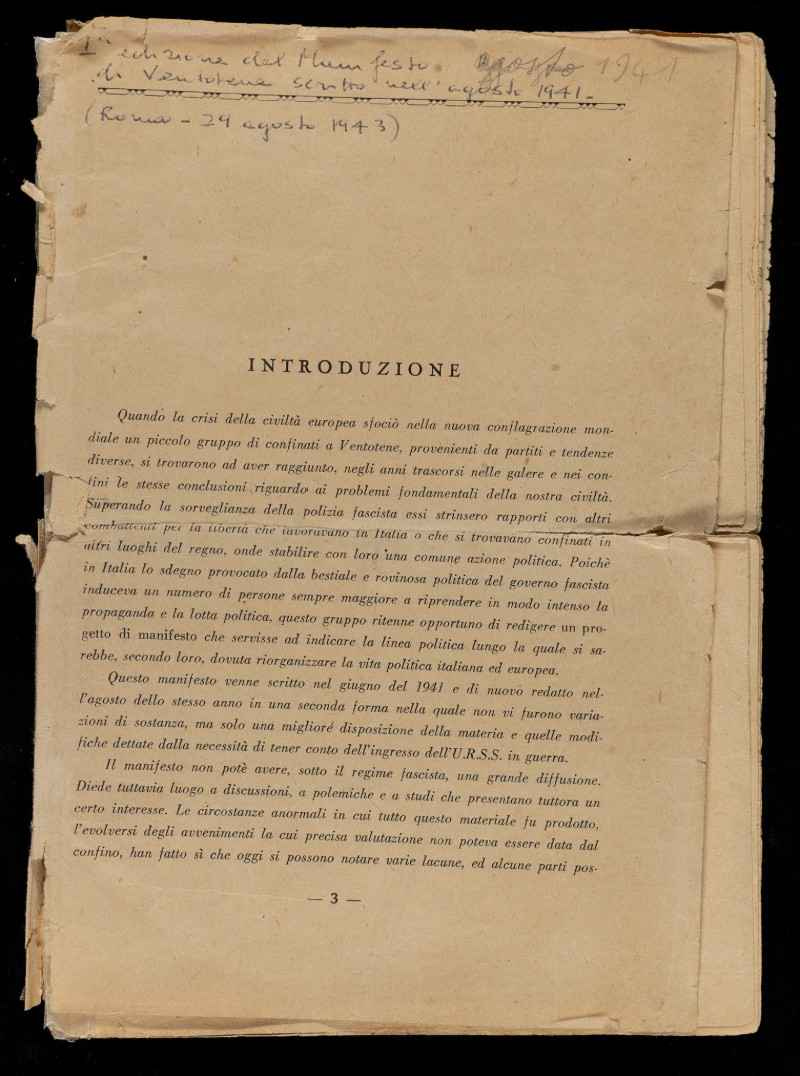
Envisioning a better Europe in 1941: a guided reading of the Manifesto.
In politics, there are no sacred texts—not even the Ventotene Manifesto. Yet cherry-picking a few sentences to support one's political agenda is both ridiculous and outrageous. The only meaningful response is to read it together. Inside its pages lies the Europe that many of us still believe in. And on one point, Meloni is right: it's not her Europe. Fortunately.
THE CRISIS OF MODERN CIVILISATION
POST-WAR TASKS. EUROPEAN UNITY
POST-WAR TASKS. THE REFORM OF SOCIETY
1 - THE CRISIS OF MODERN CIVILISATION
The first part examines how the idea of nation—initially a source of economic, social, and civil progress—developed and contained within itself the seeds of nationalism.
“The ideology of national independence initially served as a powerful force for progress. However, it contained within itself the seeds of capitalist imperialism—which our generation has witnessed evolve into totalitarian states and the outbreak of world wars.”
It outlines how corporations, big capital, and military classes gradually undermined and destroyed the institutions that had empowered working classes: trade unions, progressive taxation, and guarantees of individual rights.
“The absolute sovereignty of nation-states has driven each to seek domination, as they feel threatened by others' power and view their "living space" as territories that must expand to ensure their free movement and self-sufficiency. This drive for dominance can only be satisfied through the strongest state's hegemony over all other subjugated states.”
To achieve strict control over the masses, including their consciousness, they went so far as to reject scientific progress—creating what we now call alternative truths and myths (or fake news?), such as those about race and "living space."
“New dogmas to be accepted by faith, or to be accepted hypocritically, are setting up camp as masters in all sciences. Even though no one knows what a race is, and the most elementary historical notions reveal its absurdity, physiologists are demanded to believe, prove and convince that one belongs to a chosen race, just because imperialism needs this myth to exalt hatred and pride in the masses.”
“History is distorted in its essential facts to serve the ruling class's interests. Libraries and bookshops are stripped of all unorthodox works. The shadow of obscurantism once again threatens to stifle the human spirit.”
This section notes that even in the darkest hour of the war, the democratic countries stood firm, and the authors remain confident that the dictatorships will eventually fall.
In this rising wave of resistance, they observe, we find all the progressive forces: the most enlightened workers, who have maintained their aspirations for a better life in the face of terror and flattery; the most conscious intellectuals, outraged at the degradation of intelligence; entrepreneurs, seeking freedom from the bureaucratic constraints and national isolation that limit their initiatives; and finally, all those whose innate dignity prevents them from bowing to servitude:
“The salvation of our civilization is now entrusted to all these forces.”
What should follow? Here, the Manifesto for a Free and United Europe gets to the heart of the matter.
2 - POST-WAR TASKS. EUROPEAN UNITY
How could anyone imagine the future of Europe in 1941, from an island isolated from the rest of the world? This fact alone makes the second chapter of this manifesto exceptional. The second chapter remains the vital core of the Ventotene Manifesto, which the European Union acknowledges as one of its founding texts.
What did this visionary chapter foresee? It saw a post-war period in which it wouldn't be enough to defeat Germany: in the ruins, the privileged classes would try to rebuild their old power structures, including national ones. Dismantling these structures would require a democratic revolution.
“The fall of totalitarian regimes will emotionally mean the arrival of "freedom" for whole peoples; all restrictions will have disappeared and there will automatically be widespread freedom of speech and association. It will be the triumph of democratic tendencies.”
“The culmination of their dreams is a Constituent Assembly, elected by the widest possible franchise and with the most scrupulous respect for the rights of the electorate, which would decide what constitution should be given. If the people are immature, they will make a bad one; but it can only be corrected by constant work of persuasion.”
Here, the democracies of the pre-war period demonstrated their weakness: democratic institutions voted for war credits in Germany, collapsed in Spain, and crumbled under the violence of the Russian revolution. In the chaos between the fall of the old order and the emergence of the new,
“The people (...) do not know precisely what they want or what to do. A thousand bells ring in their ears.”
With its millions of minds, the population struggles to find direction and fragments into numerous competing factions. Here are the quotes Prime Minister Meloni extracted:
“At the moment when the greatest decisiveness and boldness are needed, democrats feel lost, because they do not have a spontaneous popular consensus behind them, but only a murky tumult of passions. They see it as their duty to build this consensus, and they present themselves as exhorting preachers, when what is needed are leaders who know where they are going.”
“Democratic political methodology will be a dead weight in the revolutionary crisis.”
The same scenario had unfolded after World War I, when weak institutions failed to achieve genuine reform and quickly succumbed to totalitarian forces.However, the Manifesto's authors also caution that:
“The principle that the class struggle is the ultimate concept to which all political problems must be reduced has served as a basic guideline, especially for factory workers, and has helped to give substance to their politics as long as fundamental institutions have not been called into question; but it becomes an instrument of isolation for the proletariat when the need arises to transform the entire organisation of society.”
“Workers educated in class terms are then incapable of looking beyond their particular class or even category demands without worrying about how to link them to the interests of other social groups; or they aspire to the unilateral dictatorship of their class in order to achieve the utopian collectivisation of all the material means of production, which has been presented by centuries of propaganda as the sovereign remedy for all their ills.”
In short, the answer is not a communist revolution, because the communists,
“..at crucial moments, they constitute a sectarian element that weakens the whole. Moreover, their absolute dependence on the Russian state, which has repeatedly used them to pursue its national policy, prevents them from pursuing any policy with even minimal continuity.”
Sectarian and dependent on Russia. No, the true revolution is different: one that can create a political system that fundamentally overcomes the core problem:
“The primary problem to be solved - and without which any other progress is superficial - is the definitive abolition of the division of Europe into sovereign national states.”
“The spirits are now much better disposed towards a federal reorganisation of Europe than in the past. The hard experience of the last few decades has opened the eyes of even those who refused to see, and has brought about many circumstances favourable to our ideal. All sensible people now realise that it is impossible to maintain a balance of independent European states with a militaristic Germany on an equal footing with other countries, nor is it possible to break Germany into pieces and keep our foot on its neck after it has been defeated.”
Looking beyond the European continent, we can clearly see, as the Manifesto points out, that
“..The European Federation is the only conceivable guarantee that relations with the peoples of Asia and America can develop on the basis of peaceful cooperation, while awaiting a more distant future in which the political unity of the entire globe becomes possible.”
According to Spinelli, Rossi, and Colorni, this is the true revolution—not the dictatorship of the proletariat or a form of democratic nationalism:
“The dividing line between progressive and reactionary parties is therefore no longer along the formal line of greater or lesser democracy or greater or lesser socialism to be established, but along the new line of substance which separates those who consider the essential aim of the struggle to be the old one, that is to say, the conquest of national political power (...), from those who will consider their central task to be the creation of a solid international state, which will direct the popular forces towards this aim and, even after having gained national power, will use them primarily as an instrument to achieve international unity.”
How do we get there?
"...we must now lay the foundations of a movement capable of mobilising all forces to give birth to the new organism which will be the greatest and most innovative creation to appear in Europe for centuries; to create a solid federal state with a European army to replace the national armies; to decisively break the economic autarchies which are the backbone of totalitarian regimes; to have sufficient organs and means to enforce its decisions in the individual federal states in order to maintain a common order, while leaving the states themselves the autonomy which allows them to be flexible (...). If there are enough men in the main European countries who understand this, victory will soon be in their hands (...)
Then it will be time for new works, it will be time for new men: for the movement for a FREE AND UNITED EUROPE
3 - POST-WAR TASKS: THE REFORM OF SOCIETY
The third part of the Manifesto addresses social and economic matters. While Meloni's video quotes might suggest otherwise, the Manifesto fully supports private property as a foundation of individual economic freedom.
The principles outlined in this section—particularly regarding natural monopolies and market failures—were later enshrined in various Constitutions, including Italy's. These provisions allow the state to expropriate and nationalize property when public interest demands it. These concepts are so fundamental that they're taught in introductory economics courses. The wording may be shocking, but only if you're not familiar with political economics (which I studied too, not in the USSR but at Bocconi University in Milan! ... a long time ago)
“The European revolution, to address our needs, must be socialist—aiming to emancipate the working classes and create more humane living conditions for them.”
Working-class emancipation—not dictatorship of the proletariat—is that clear? Indeed, in opposing doctrines that advocated for collectivization, the Manifesto states that:
“The truly fundamental principle of socialism, from which general collectivization was merely a hasty and misguided conclusion, is that economic forces should not dominate humanity but rather—as with natural forces—be tamed, guided, and controlled by humans in the most rational way possible, so that the masses do not fall victim to them.”
“The powerful forces of progress that emerge from individual initiative, (...) should be enhanced and expanded through greater opportunities for development and employment, while strengthening and refining the frameworks that direct these forces toward the greatest benefit for society as a whole.”
Therefore:
“Private property shall be abolished, limited, corrected or extended on a case-by-case basis, not on the basis of dogmatic principles.”
The Manifesto outlines principles that, while potentially challenging to those who favor American-style extreme liberalism (or Trump's approach), align with the social democratic model Europe has embraced over the past 80 years:
“Companies engaged in inherently monopolistic activities that could exploit consumers must not remain in private hands; (...); and companies that could pressure state bodies through their massive capital investments, large workforce, or dominance in critical sectors (...).”
This was followed by a call for agrarian reform that would "transfer land to those who cultivate it, vastly increasing the number of property owners," alongside an industrial reform to "expand workers' ownership in non-nationalized sectors through cooperative management, worker shareholding, and similar measures." It's important to note that cooperatives played a vital role in Italy's economic miracle of the 1960s.
The manifesto further states:
“Young people must be supported with necessary resources to reduce the gaps in their starting circumstances. Specifically, public schools should ensure that higher education opportunities are available to the most capable students, not just the wealthiest ones.”
Then, the document describes how the Welfare State should function: you know what I mean? It's that system with unemployment benefits, minimum pensions, and aid for struggling families—designed to prevent extreme poverty in our society. A quintessentially European approach: is this also something Prime Minister Meloni opposes?
Finally, the importance of free trade unions:
“Workers must be free to choose their representatives for collective bargaining over their working conditions, and the state must provide legal mechanisms to enforce compliance with the resulting agreements.”
“On this basis, political freedoms will have real substance, not just formal content, for all citizens, because the public will have the independence and understanding necessary to maintain constant and meaningful oversight of the ruling class.”
According to the Ventotene Manifesto, implementing all of this is the task of a "revolutionary party"—which today we would call "reformist." However, in the face of Nazi-Fascism, advocating for freedom, social justice, universal participation, and European federation was truly revolutionary. The Manifesto therefore concludes:
“Today is the time when we must cast off our outdated burdens, remain ready for the approaching future—so different from all we imagined—discard the ineffective among the old guard, and ignite fresh energy among the young.”
“Today, those who understand the root causes of European civilization's current crisis are finding one another and joining forces, weaving the fabric of our future. In doing so, they carry forward the legacy of all movements for human progress that faltered—not for lack of noble aims, but from confusion about their goals or means. The path ahead is neither easy nor certain. But it must be traveled, and it will be!”
This is the English edition of the manifesto, preceded by an introduction written by the authors themselves in 1944:
Here is the German version:
Conclusion: Meloni, Europe, today, tomorrow.
No text is sacred, not even the Bible. All texts are human, including the Bible. But the vision of that manifesto has evolved, through a difficult, bumpy and unfinished journey, into the Europe we know today.
Today, we see Europe's enemies clearly: some have been against it from the beginning, while others - like the Trump administration, which declares Europe to be a project born to harm America (!) - are newcomers to the anti-European opposition.
The Ventotene Manifesto is an antifascist document: Europeanism is antifascist. Meloni declared that the Europe of the Ventotene Manifesto is not her Europe. She didn't have to resort to a few phrases of that document to prove this point. We already knew it, as Meloni knows it - and as they know it in Paris, Berlin, Brussels, Warsaw and among our friends in London.
It's a wonderful thing that attention has returned to this Manifesto, to the men who wrote it, and to those who worked to ensure that others could read it. For once, thank you, Meloni!
P.S. There's also a little side story I'd like to add - that of a great woman from Berlin, without whom the Ventotene Manifesto would never have reached us: below. I can't imagine a better ending for a blog called "Beyond Berlin"!
THE FEMALE SIDE OF THE STORY
Ursula Hirschmann: Without this woman, the Ventotene Manifesto would never have reached us.
Berliner, Anti-fascist, and Great European Ursula Hirschmann, born in 1913 in Berlin to a Jewish family, had a pivotal role in the distribution of the Ventotene Manifesto. After joining the Social Democratic Party's youth organization in 1932 to oppose Nazism, she fled to Paris in 1933 with her brother Albert. There, she met Italian philosopher Eugenio Colorni, whom she married in 1935 in Trieste.
When Colorni was imprisoned on Ventotene island, Hirschmann joined him and became instrumental in the anti-fascist resistance. Her most significant achievement was smuggling and distributing the Ventotene Manifesto, which outlined the vision for a united Europe. After Colorni's murder by fascists in 1944, she married Altiero Spinelli and helped establish the European Federalist Movement.
Throughout her life, Hirschmann remained dedicated to European integration and women's rights, founding Women for Europe in Brussels in 1975. Her activism continued until her death in 1991, leaving an enduring legacy in European politics.
May her memory be a blessing.
Born in 1907 to a socialist family in Rome, Altiero Spinelli joined the Communist Party in his youth. Following his arrest in 1927, he devoted his prison time to studying politics, ultimately abandoning communism in favor of federalism. During his house arrest on Ventotene island, he collaborated with fellow prisoners to write the Ventotene Manifesto.
After his release in 1943, Spinelli established the European Federalist Movement and collaborated with resistance groups promoting European unity. He rose to lead the European Union of Federalists by 1946, cementing his position as a founding father of Europe. As European Commissioner (1970–1976) and subsequently as Member of the European Parliament, he championed federalist reform. His influential "Draft Treaty Establishing the European Union" (1984) garnered widespread support and shaped both the Single European Act and Maastricht Treaty. Spinelli remained active in the European Parliament until his death in 1986. The European Parliament honored his legacy in 1999 by naming its main building after him.
Eugenio Colorni was born in Milan in 1909 to a Jewish family. He married Ursula Hirschmann, a German Jewish woman and sister of economist Albert O. Hirschmann. Together they had three daughters: Silvia, Renata, and Eva Colorni. In 1930, Colorni joined the Milan division of the anti-fascist movement Giustizia e Libertà. A philosopher and high school teacher, Colorni intensified his political resistance against the fascist regime by 1935.
In 1938, he was arrested in Trieste for being both Jewish and an anti-fascist militant and was confined to the island of Ventotene from January 1939 to October 1941. There, he embraced European federalism and collaborated with Spinelli and Rossi in drafting the Ventotene Manifesto. After being moved to other confinement locations, he managed to escape to Rome in 1943 and published the Manifesto along with additional writings by Spinelli.
After the fall of fascism on July 25, 1943, he helped organize the Italian Socialist Party of Proletarian Unity, and together with his wife Ursula Hirschmann, was among the founding members of the European Federalist Movement. In the meantime, Rome was occupied by the Nazis. On May 28, 1944, mere days before the liberation of Rome, he was killed by a fascist militia at age 35.
Ernesto Rossi was born in Caserta in 1897. After graduating, he volunteered for World War I, where he was severely wounded. Though initially drawn to nationalism after the conflict, he soon embraced democratic and anti-fascist positions. In 1924, he joined the Democratic National Union and helped establish the secret anti-fascist organization "L'Italia Libera." He served as an editor of the anti-fascist periodical Non Mollare! and in 1929 co-founded the "Justice and Liberty" movement. Arrested that same year, he received a twenty-year prison sentence, serving nine years before being confined to Ventotene.
On Ventotene, collaborating with Altiero Spinelli and Eugenio Colorni, he developed the Ventotene Manifesto. Upon his release in 1943, he joined the Resistance and served on the Action Party's executive board. After the war, he took the role of Undersecretary for Reconstruction in 1945 and later helped establish the Radical Party in 1955.
Throughout this period, Rossi developed innovative proposals for social and economic development, most notably in his essay Abolishing Poverty. His work outlined a social protection system to guarantee essential goods and services for all citizens. He advocated for a more dynamic form of capitalism, free from state inefficiencies, while criticizing both clerical interference and trade union corporatism.





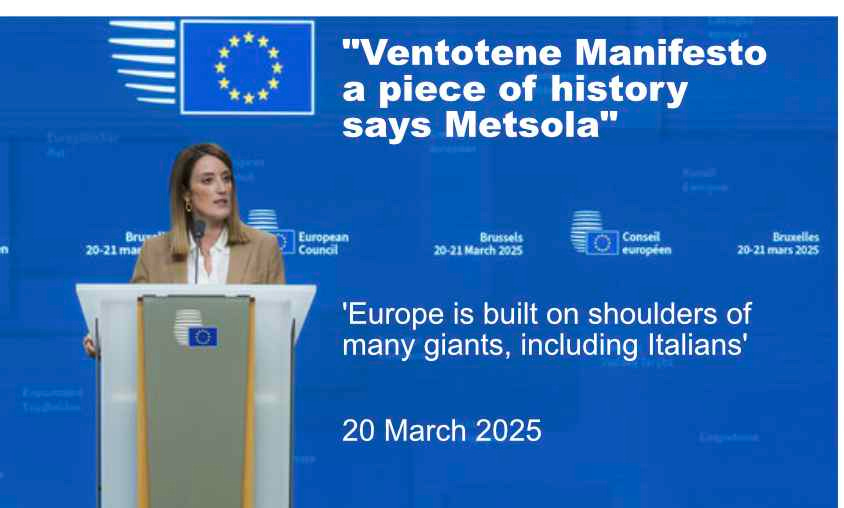
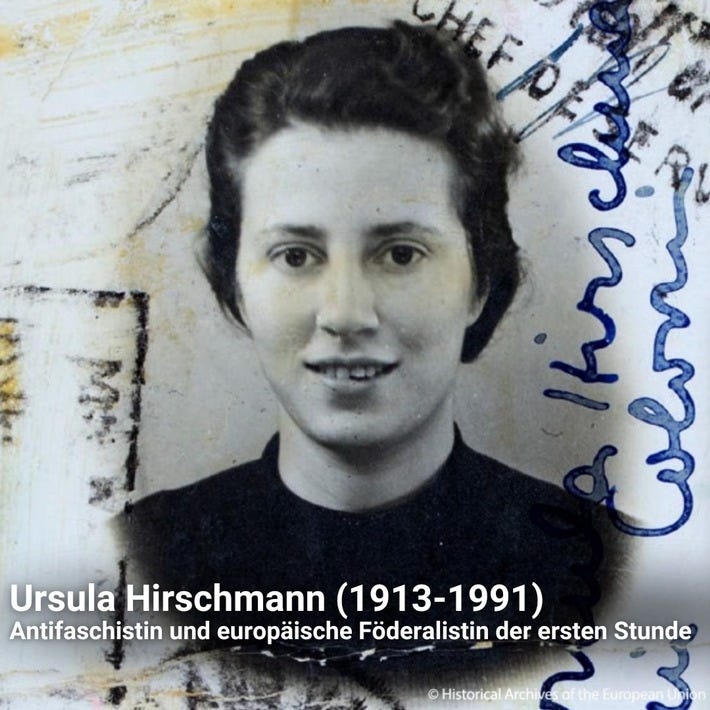
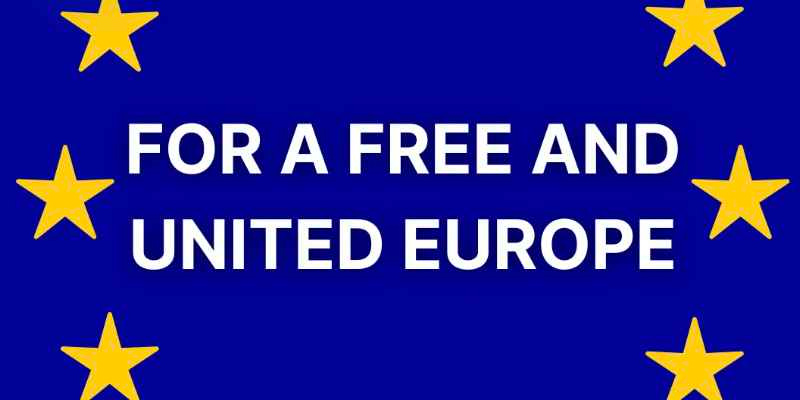
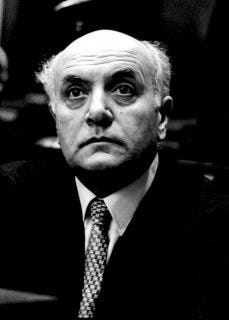
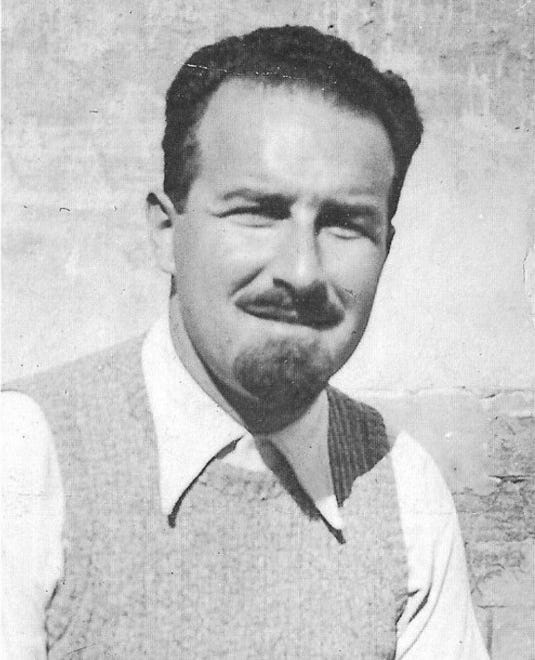
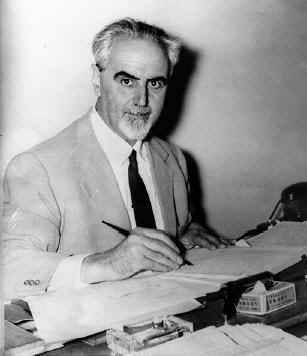

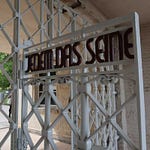





Share this post